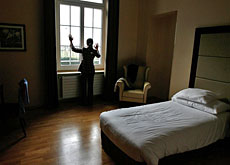Scientists unlock sleep mysteries

A Lausanne University research team has taken a step closer to answering a question that has baffled scientists for centuries – why do humans need to sleep?
Studying sleep deprivation in mice, the team has managed to determine what happens in the brain at the molecular level when asleep, and to isolate a gene that regulates sleep activity.
“I was always amazed that no one knew why we sleep,” Mehdi Tafti, head of the research project at Lausanne University’s Centre for Integrative Genomics, told swissinfo.
Tafti, an expert in sleep disorders, has spent the past 20 years trying to work out why humans spend a third of their lives in bed.
His research team recently published their findings in the Proceedings of the National Academy of Science journal, identifying a gene – Homer1a – that controls levels of calcium in neurons in the brain.
Mice, like humans, need calcium to function when awake, but the longer they are up and about, the more calcium builds up, and when the levels get too high, the neurons get over-stimulated.
Sleep, therefore, is nature’s way of reducing these excessive calcium levels in the brain. And Homer1a plays a key role.
“This gene regulates the levels of calcium to protect against hyperactivity of the brain,” explained Tafti. “The more you stay awake, the more it is activated.”
It rings an alarm bell in your head and tries to counterbalance the build-up, warning: “Be careful, calcium is trying to get in – you have to regulate it otherwise it’s going to be toxic,” he added.
Sleep deprivation
“In animal models, sleep deprivation is lethal; sleep deprived rats or mice die after two or three weeks – but we don’t know why,” said the Lausanne professor.
“It has never been tested in humans but long-term sleep deprivation would probably lead to death.”
Whether you are able to snooze until midday or wake up at the crack of dawn is all down to your genes, say experts. But what’s the minimum amount of shut-eye we can get by on each night?
“The hypothesis is that there is a core amount of sleep that everybody needs, probably about five to six hours,” he said.
“I always say it’s like food intake. You need a certain amount of food but you know that everybody eats more than what we need. Sleep is regulated in the same way.”
Possible applications
The fact that humans also possess the Homer1a gene therefore opens up a huge field for possible medical applications.
It could be used to help people control their tiredness and stay awake longer, or at the other extreme improve the recovery process during sleep.
Tafti also imagines possible uses for treating people suffering from depression or schizophrenia. The scientists believe that there is a high chance the newly identified gene has an important influence on the sleeping disorders of people suffering from depression.
Contrary to what might first be imagined, sleep deprivation is an extremely potent anti-depressant.
“The problem is that it doesn’t last long as when they go back to sleep they wake up depressed,” he said.
“If you remove this gene in mice, they may have a depressive-like behaviour and if you over-express the gene you can treat the depression,” said Tafti.
Tests using humans are expected to start within the next four to five years.
swissinfo, Simon Bradley in Lausanne
While sleep is essential for survival, its purposes are only partly clear and are the subject of intense research.
Lack of sleep has serious effects on our brain’s ability to function. With continued lack of sufficient sleep, the part of the brain that controls language, memory, planning and sense of time is severely affected, practically shutting down.
Research also shows that sleep-deprived individuals often have difficulty in responding to rapidly changing situations and making rational judgements. In real life situations, the consequences are grave. Lack of sleep is said to have been be a contributory factor in a number of international disasters such as Exxon Valdez, Chernobyl, Three Mile Island and the Challenger shuttle explosion.
Sleep deprivation not only has a major impact on cognitive functioning but also on emotional and physical health. Disorders such as sleep apnoea which result in excessive daytime sleepiness have been linked to stress and high blood pressure.
Research has also suggested that sleep loss may increase the risk of obesity because chemicals and hormones that play a key role in controlling appetite and weight gain are released during sleep.

In compliance with the JTI standards
More: SWI swissinfo.ch certified by the Journalism Trust Initiative












You can find an overview of ongoing debates with our journalists here . Please join us!
If you want to start a conversation about a topic raised in this article or want to report factual errors, email us at english@swissinfo.ch.